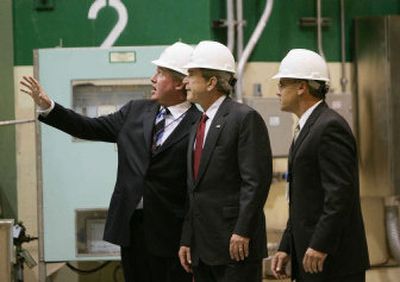House trims nuclear proposal

WASHINGTON – The House late Wednesday scaled back President Bush’s ambitious plan to resume nuclear fuel reprocessing as part of an international program to boost nuclear power.
A broad spending bill, passed 404-20 and sent to the Senate, cuts Bush’s request for the first installment of the nuclear initiative in half, to about $130 million. An attempt to slash it by an additional $40 million was rejected.
The $30 billion spending measure funds the Energy Department, related agencies and numerous federal water projects.
While lawmakers expressed skepticism about the nuclear fuel recycling proposals, dubbed the Global Nuclear Energy Partnership, they plan to resume full funding for development of a nuclear waste dump at Yucca Mountain in Nevada after several years of reduced spending on the program.
The Yucca project, which has yet to receive a license from the Nuclear Regulatory Commission, is years behind schedule with no firm date for completion. It is designed to hold 77,000 tons of used reactor fuel from commercial power plants and defense facilities.
The bill provides $545 million for Yucca in fiscal 2007 beginning in October, an increase of $95 million over this year. It is the amount the president had requested.
The House action came on a day that Bush, touring the Limerick nuclear power plant in Pennsylvania, called the expansion of nuclear power and more construction of commercial reactors essential “for the sake of economic security and national security.”
He urged Congress to give him the full $250 million for the Global Nuclear Energy Partnership.
The Senate is likely to do just that. Sen. Pete Domenici, R-N.M., who heads the subcommittee that deals with energy funding, said he planned to possibly seek more than $250 million. If he succeeds, the different spending levels would have to be reconciled.
The Global Nuclear Energy Partnership calls for stepped-up research into reprocessing nuclear fuel, instead of using it once and then disposing it eventually in the planned Yucca Mountain repository. And it would establish an international program under which the United States would provide reactor fuel to other countries and then retrieve it for reprocessing.
The United States abandoned nuclear fuel reprocessing in 1977 because of concern that it would make it easier to steal or divert plutonium for a nuclear bomb. Bush’s plan envisions a new technology that would not separate pure plutonium, removing – according to its advocates – the proliferation risks.
But the House Appropriations Committee, in a report accompanying the spending bill, said the Energy Department has not produced the needed details about the program’s cost – estimated into the billions of dollars over several decades – or the certainty of the proposed technology.
“There’s only a guess of how much it’s going to cost … $3 billion to $6 billion for a demonstration project,” said Rep. Ed Markey, D-Mass. And he said the proposed technology, while it may no longer be useful for a nuclear bomb, would “not be too dangerous for terrorists to handle for a dirty bomb.”
But Markey’s attempt to slash an additional $40 million from the program was defeated 295-128.